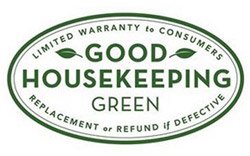I know, as a green techie, your only exposure to Good Housekeeping is the doctor’s/dentist’s office. Why should you care what it says?
If your cool, energy-saving tech is going to make any headway with mainstream consumers, Good Housekeeping provides a great window into how receptive they’ll be to your green goods. And fortunately, during the Good and Green Conference held in NYC, the magazine and issuer of the swank seal pictured above released the results of a recent survey that spells good news for eco-conscious vendors.
Overall, the data shows that environmental concerns are emerging as a strong influencer in purchasing decisions. Green marketers, on the other hand, better start thinking of ways of making their claims resonate with a skeptical public — and more importantly, be able to back up those claims.
Here are some of the enlightening findings:
- 90% of respondents said they are concerned with improving the environment and 40% said they are “very” concerned.
- 83% of respondents said they have made changes to lead an eco-friendly lifestyle.
If you build it, will the customers come? Signs point to yes…
- 88% of respondents seek out and purchase eco-friendly products.
- 62% of respondents always purchase energy-efficient appliances.
- 55% of respondents always use low-energy/compact fluorescent light bulbs.
Marketers, your green messaging is being heard loud and clear, but beware exaggerating or outright faking your green credentials. And woe be the company that wrongs a green consumer.
- 84% of respondents said they pay attention to advertisers with an environmental message.
- 79% think eco-friendly claims made by some products are exaggerated.
- 28% think that if an ad says a product is eco-friendly, it really is.
- 68% of respondents are very likely to tell others if they discover that a company is being unethical and irresponsible.
The lesson here is that it doesn’t hurt to play up your product’s green attributes. But to avoid a PR fiasco, make utterly sure that your environmentally-friendly claims hold water. It’s one thing for the Internet to rage against a greenwasher, but if moms, dads, sisters, brothers and neighbors start spreading some bad word-of-mouth, your product’s really doomed.


If you’re interested in purchasing handcrafted, local and green products, see the directory at http://www.greenpeople.org. We’ve only selected products that meet stringent green criteria. There are thousands of eco-friendly products and services available to meet household needs.
You’re not alone, most people care about #green products and truth in advertising. http://tinyurl.com/3qveoz6
At #goodgreen conference, we announced that our readers really care about being green. http://tinyurl.com/6lcqpvy
GreenBearGirl: You’re not alone, most people care about #green products and truth in advertising. http://tinyurl.com/3qveoz6 (expand)
Good Housekeeping: Consumers overwhelmingly care about green … http://bit.ly/lex7yT
I bet you find that, whatever these consumers say, they’re still more responsive to recommendations from trusted friends and family members.